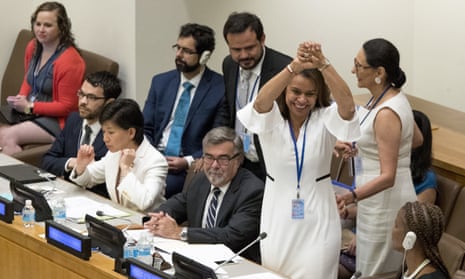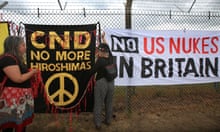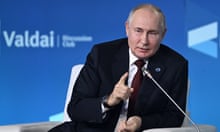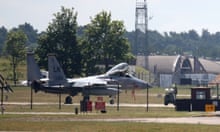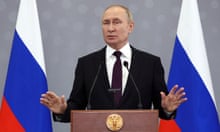More than 70 years after the world witnessed the devastating power of nuclear weapons, a global treaty has been approved to ban the bombs, a move that supporters hope will lead to the eventual elimination of all nuclear arms.
The treaty was endorsed by 122 countries at the United Nations headquarters in New York on Friday after months of talks in the face of strong opposition from nuclear-armed states and their allies. Only the Netherlands, which took part in the discussion, despite having US nuclear weapons on its territory, voted against the treaty.
All of the countries that bear nuclear arms and many others that either come under their protection or host weapons on their soil boycotted the negotiations. The most vocal critic of the discussions, the US, pointed to the escalation of North Korea’s nuclear and ballistic missile programme as one reason to retain its nuclear capability. The UK did not attend the talks despite government claims to support multilateral disarmament.
“It’s been seven decades since the world knew the power of destruction of nuclear weapons and since day one there was a call to prohibit nuclear weapons,” Elayne Whyte Gómez, president of the UN conference, told the Guardian. “This is a very clear statement that the international community wants to move to a completely different security paradigm that does not include nuclear weapons.”
The 10-page treaty on the prohibition of nuclear weapons will be open for signatures from any UN member state on 20 September during the annual general assembly. While countries that possess nuclear weapons are not expected to sign up any time soon, supporters of the treaty believe it marks an important step towards a nuclear-free world by banning the weapons under international law.
“It’s a prohibition in line with other prohibitions on weapons of mass destruction,” said Beatrice Fihn at the International Campaign to Abolish Nuclear Weapons in Geneva. “We banned biological weapons 45 years ago, we banned chemical weapons 25 years ago, and today we are banning nuclear weapons.” Within two years the treaty could have the 50-state ratifications that it needs to enter into international law, she said.
Previous UN treaties have been effective even when key nations have failed to sign up to them. The US did not sign up to the landmines treaty, but has completely aligned its landmines policy to comply nonetheless. “These kinds of treaties have an impact that forces countries to change their behaviour. It is not going to happen fast, but it does affect them,” Fihn said. “We have seen on all other weapons that prohibition comes first, and then elimination. This is taking the first step towards elimination.”
Under the new treaty, signatory states must agree not to develop, test, manufacture or possess nuclear weapons, or threaten to use them, or allow any nuclear arms to be stationed on their territory.
Richard Moyes, managing director of Article 36, a UK organisation that works to prevent harm from nuclear and other weapons, said the negotiations had made clear that “a substantial number of states think that killing hundreds and thousands of people and poisoning their environment is morally wrong and that this should be reflected in law”.
He added: “The UK, along with other states that possess nuclear weapons, has chosen to boycott these talks, but the process has shown that any group of committed and concerned states can and should take collective responsibility to reject these horrific weapons.”
Instead of scrapping their nuclear stocks, the UK and other nuclear powers want to strengthen the 1968 nuclear nonproliferation treaty (NPT), a pact that aims to prevent the spread of the weapons outside the original five nuclear powers: the US, Russia, Britain, France and China. It requires countries to hold back from nuclear weapons programmes in exchange for a commitment from the nuclear powers to move towards nuclear disarmament and to provide access to peaceful nuclear energy technology. The new treaty reflects a frustration among non-nuclear states that the NPT has not worked as hoped.
